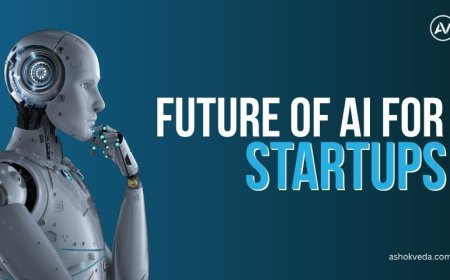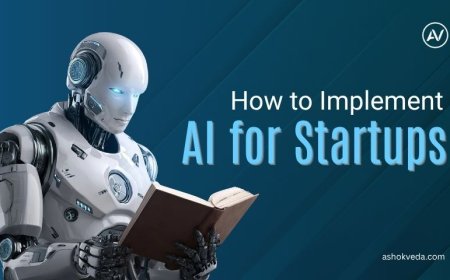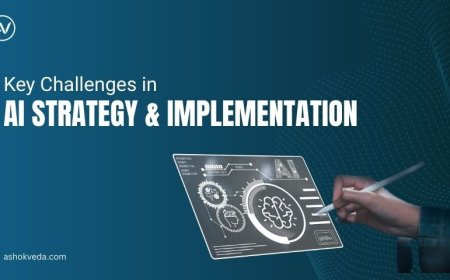Debunking Popular Myths About AI Consulting
Discover and debunk the most popular myths about AI consulting in 2025. Learn the realities of AI implementation, its benefits, and how businesses can leverage AI effectively.
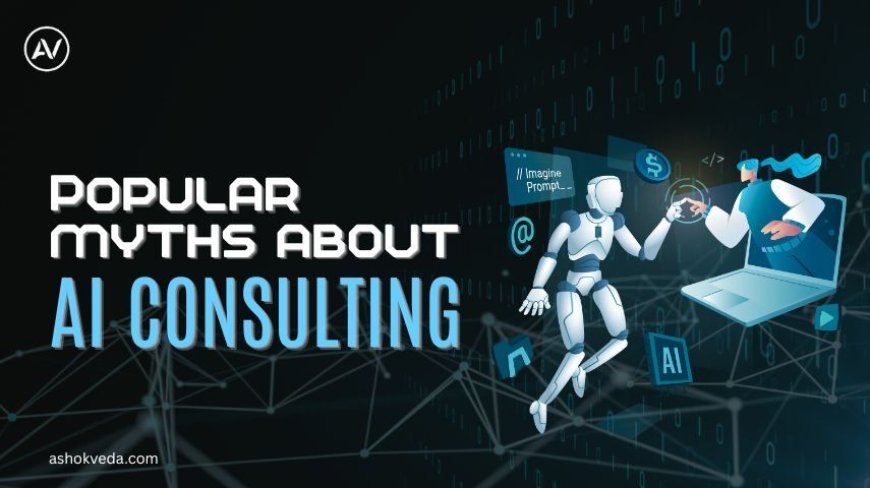
Artificial intelligence (AI) has become a central driver of business transformation in 2025. According to recent studies, 78% of organizations now use AI in at least one business function, from marketing and customer service to supply chain management. Despite its widespread adoption, misconceptions about AI consulting continue to circulate, creating confusion and unrealistic expectations for companies looking to leverage AI effectively.
Understanding the popular myths about AI consulting is essential for leaders, product managers, and decision-makers. Misunderstandings can lead to wasted budgets, stalled projects, or missed opportunities. This blog will explore the most common myths, clarify the realities of AI consulting, and provide actionable insights to help organizations maximize the impact of their AI initiatives, from strategy and implementation to long-term growth.
Why this matters
Companies are investing heavily in AI strategy, tools, and people—and many turn to consultants to accelerate outcomes or fill gaps in talent. But confusion about what consultants do, how value is delivered, and what risks exist creates poor expectations, wasted budgets, and stalled projects. Clearing up common myths helps you hire smarter, evaluate proposals properly, and get real ROI.
Myth 1: AI consultants just sell buzzwords; they won’t deliver measurable business results
This is one of the most common complaints. The truth: some consultants over-promise, but many deliver measurable value when the engagement is scoped correctly.
Why the myth persists:
-
Early-stage vendors and boutiques sometimes sell proof-of-concepts that don’t translate into production.
-
Executive expectations (instant revenue lifts or full automation) are unrealistic.
Reality checklist:
-
Top consultancies pair strategy with engineering and change management—not just presentations. McKinsey’s research shows companies are embedding AI across business functions (IT, marketing, service ops), but only a small percentage are “maturely” integrated, indicating implementation complexity, not lack of potential.
-
Look for consultants who propose measurable KPIs (e.g., improved lead conversion rate by X% and reduced processing time by Y%) and include a plan for productionization and operational governance.
Myth 2: AI consulting is only for big enterprises—small and mid-market firms don’t benefit
Not true. While large firms have more resources, the economics of AI and the availability of cloud AI services make consulting accessible for smaller organizations, too.
Evidence:
-
Adoption statistics show rapid, broad uptake across company sizes—organizations of various scales are using AI for marketing, IT, and operations.
-
Many consultants now offer modular, outcome-based engagements (MVP → scale) and can leverage pre-trained models and cloud platforms to reduce costs.
Practical tip:
-
For SMBs, ask for phased engagements: pilot, validate with metrics, then scale. This lowers risk and gives your team time to absorb capabilities.
Myth 3: A single AI consultant will solve all our data and engineering problems
Wrong, AI consulting is multidisciplinary. Expect teams, not lone heroes.
What consulting teams bring:
-
Strategy & framing (business case, metrics)
-
Data engineering (pipelines, quality, integration)
-
ML engineering/DevOps (model training, deployment, monitoring)
-
Change management & adoption (process redesign, upskilling)
Large firms and reputable consultancies provide these roles; boutique shops often partner with specialists to cover gaps. McKinsey’s 2025 research highlights that while AI use is widespread, most organizations are still early in the rewiring process—meaning deep integration requires multiple skill sets.
Hire wisely:
-
Map required skills before engaging: do you need MLOps, data engineering, or UX + change management?
-
Insist on resumes and prior case examples for each role.
Myth 4: AI consulting is just about models and algorithms
Partly false. Models matter, but sustainable impact stems from process, data, product fit, and operations.
Why model-centric thinking fails:
-
A high-performing model without reliable data pipelines, monitoring, or business alignment will degrade quickly or never be used.
-
Governance, privacy, and explainability are increasingly important—not optional.
Evidence from market behavior:
-
Reports show that while capital and tooling pour into AI, many projects stall in deployment or fail to show sustained ROI—a sign that non-model factors matter. Gartner’s 2025 Hype Cycle and other industry analyses emphasize the importance of operational readiness and realistic expectations.
What consultants should deliver:
-
Data readiness assessment, integration roadmap, deployment & monitoring plan, and a change/adoption strategy.
Myth 5: Hiring top AI consulting firms is prohibitively expensive and gives limited ROI
Reality is nuanced. Premium consultancies are expensive, but the price is worth it. ROI depends on problem selection, governance, and execution.
Data & trends:
-
The AI consulting market is growing fast, forecasts show large CAGR estimates for the decade ahead as firms seek help translating pilots to production. Reports project the AI consulting services market to grow substantially from a 2025 baseline.
How to get ROI:
-
Start with high-value, low-complexity use cases (e.g., automation of repetitive processes, improved lead scoring).
-
Negotiate success metrics and link payment tranches to outcomes (MVP delivery, production deployment, defined KPIs).
Myth 6: AI consultants will replace my team
This is a fear-based myth. In reality, good consultants augment internal talent and focus on the transfer of capabilities.
Why it’s mostly false:
-
Leading consultancies and companies invest in upskilling staff; many programs aim to make internal teams self-sufficient (only 1% of companies consider themselves fully mature, so the need for internal capability building remains high).
-
Consultants are useful for jumpstarting programs, providing rare skills, and shepherding initial deployments. Post-engagement, the successful model is “consultant + internal team” rather than replacement.
Advice for leaders:
-
Require a knowledge transfer plan and training/coaching in the contract.
-
Ask for documents, runbooks, and handover sessions as deliverables.
Myth 7: All AI consultants are the same—you can hire anyone with an ML badge
Not at all. There’s a huge variation in domain experience, industrial knowledge, and operational maturity.
How they differ:
-
Strategy-first firms: focus on roadmaps, use-case selection, and organizational readiness.
-
Tech-first firms: strong engineering and MLOps capability, but may lack domain translation.
-
Hybrid firms combine domain expertise, engineering, and scaling experience, often making them the best fit for end-to-end delivery.
Hiring checklist:
-
Demand use-case references in your industry (retail, finance, healthcare).
-
Check for reproducible deployment case studies and operational monitoring examples.
Myth 8: AI consulting guarantees quick wins because of LLMs and generative AI hype.
Generative AI (LLMs) is transformative, but it’s not a turnkey solution for every problem.
What LLMs can and can’t do:
-
LLMs accelerate content tasks, summarization, and semantic search but require careful prompt engineering, guardrails, and evaluation.
-
LLMs are powerful for prototypes—but production quality requires retrieval systems, hallucination mitigation, cost controls, and monitoring.
McKinsey and other industry reports indicate widespread experimentation with generative AI, but caution about the maturity and integration challenges it poses.
Best practice:
-
Treat LLMs like a component—validate business impact, evaluate risks (privacy, bias), and design for human-in-the-loop checks.
Key Benefits of Hiring an AI Consultant
Bringing in an AI consultant goes beyond technology implementation. Here’s why organizations benefit:
-
Accelerated Strategy Development: Consultants help identify high-impact AI use cases and align them with business objectives.
-
Access to Expertise: Specialized skills in machine learning, NLP, computer vision, and AI ethics that may not exist in-house.
-
Faster Deployment: Guidance on data pipelines, model selection, and deployment reduces trial-and-error cycles.
-
Operational Efficiency: Automation of repetitive tasks and optimized workflows save time and cost.
-
Risk Mitigation: Experts ensure compliance with privacy, ethical AI guidelines, and regulatory requirements.
-
Knowledge Transfer: Consultants train internal teams to manage and maintain AI solutions independently.
-
Scalable Solutions: Ensures AI initiatives can grow with business needs, avoiding one-off prototypes.
These points make it clear why AI consulting is an investment, not just a cost.
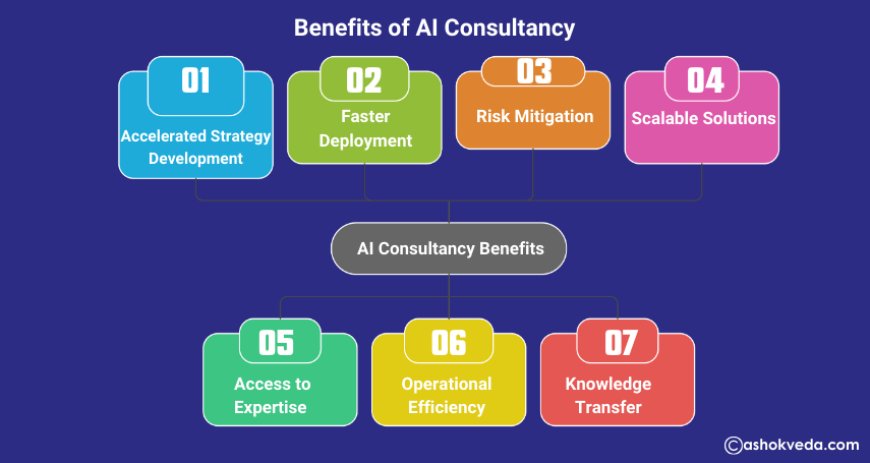
How to evaluate AI consulting proposals—a practical rubric
Use this simple scoring rubric to cut through buzz:
-
Business clarity (20%): Are KPIs defined? Is ROI estimated and realistic?
-
Data readiness (20%): Is there an honest assessment of data quality, access, and gaps?
-
Technical approach (15%): Is there a clear path to production (MLOps, monitoring)?
-
Team composition (15%): Are data engineers, ML engineers, and product owners included?
-
Change & adoption (10%): Is there a plan to upskill staff and integrate workflows?
-
Ethics & compliance (10%): Are privacy and bias checks included?
-
Commercial alignment (10%): Are milestones and success metrics linked to payments?
A strong proposal scores well across all items—not just on the “model” line.
Final checklist—before you hire an AI consultant
-
Define one clear business outcome (not “we want AI” but “increase X by Y%”).
-
Request a phased plan (pilot → production → scale) with measurable KPIs.
-
Verify team CVs and references, especially for production deployments.
-
Insist on a knowledge transfer and upskilling plan.
-
Include governance, monitoring, and a maintenance SLA.
-
Negotiate payment linked to milestones and demonstrable outcomes.
The popular myths about AI consulting often arise from early hype cycles, mismatched expectations, and a shortage of implementation know-how. The data in 2025 shows both explosive interest in AI and a real maturity gap—a situation that makes high-quality consulting extremely valuable if you treat the engagement as a partnership focused on measurable outcomes, upskilling, and sustainable operations. If you’re evaluating consultants, prioritize business clarity, data readiness, and operational plans over flashy demos. That’s how AI becomes more than a headline—it becomes a repeatable source of value.

























